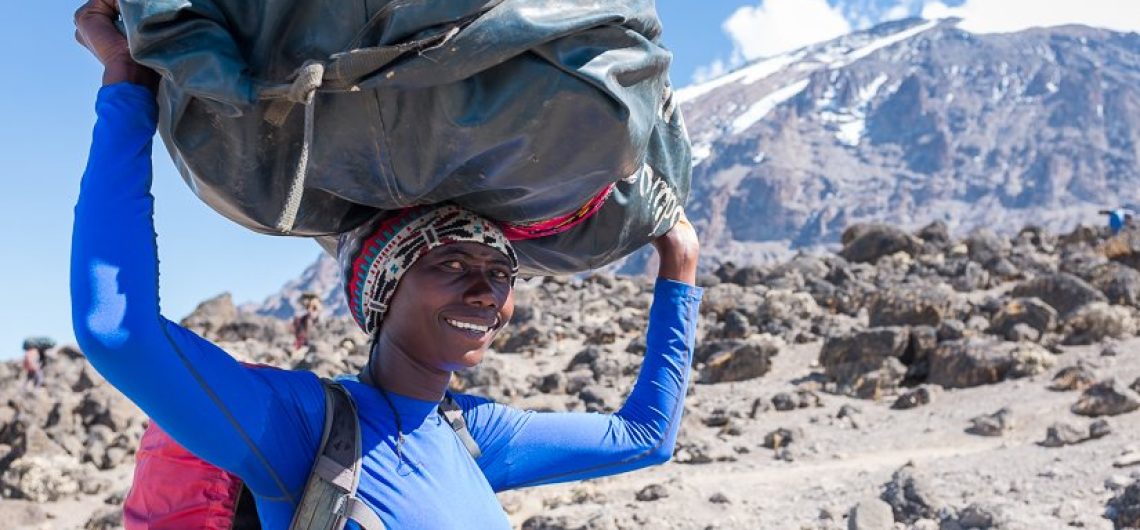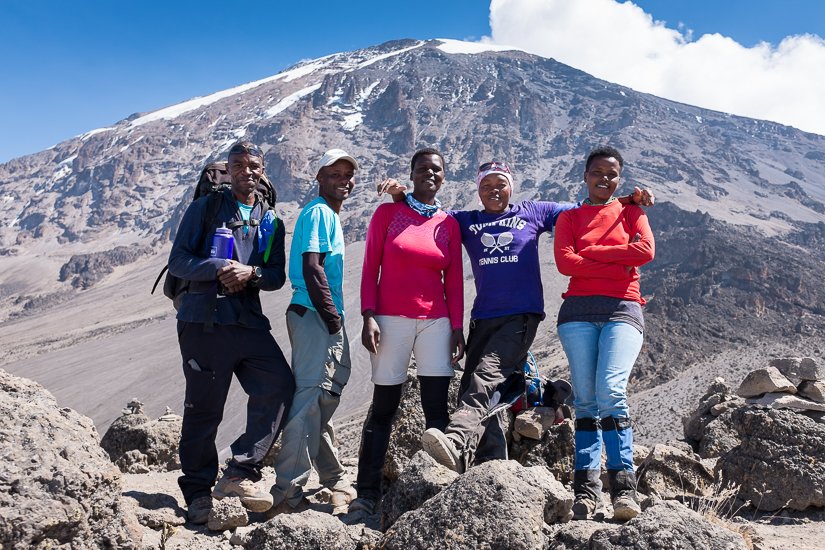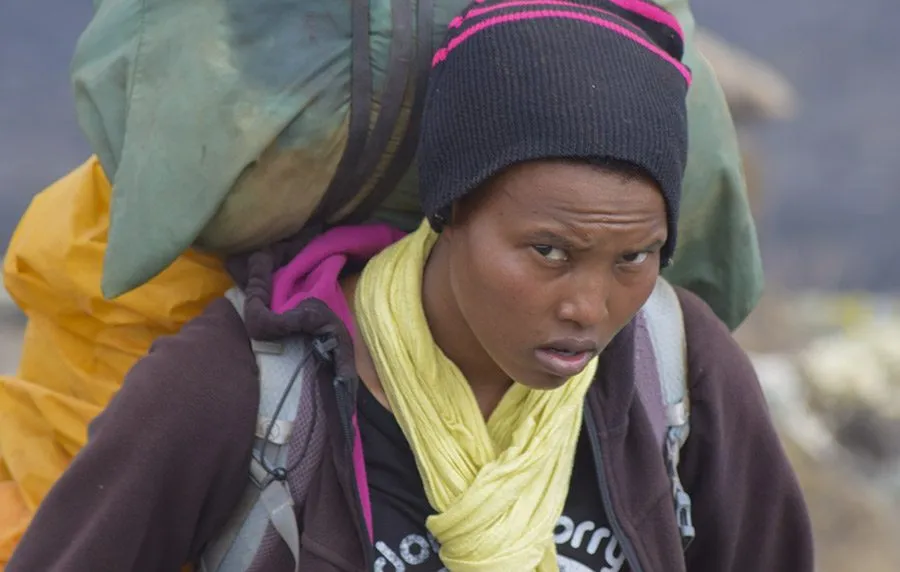Mount Kilimanjaro is witnessing a growing number of female guides leading trekkers to its majestic summit also, accompanied sometimes by female porters in a much, male-dominated industry. Just as female porters have broken traditional gender norms in the trekking industry, these female guides are making significant strides in promoting gender equality and empowerment on the mountain.
Are there female guides and porters on Kilimanjaro? Yes, there are! While still relatively uncommon to see female-guided groups on Kilimanjaro, there is a significant number of female porters who have been carrying gear and equipment for hikers for many years. Some of them have been working on the mountain for extended periods, driven by various motivations, from earning extra income for their families to fulfilling their dream of working in tourism. These remarkable women play a vital role in supporting trekkers’ journeys on the mountain.
Promoting Equal Rights and Opportunities
At Tranquil Kilimanjaro, we are committed to promoting equal rights and fair treatment for all our guides and porters, regardless of gender. In line with this commitment, we have established an all-female team led by our main female guide, Josephine, along with experienced female porters. This initiative aims to empower women in the tourism industry in Tanzania by providing them with equal opportunities and fair compensation.
Challenges for Local Women
Tanzanian women face unique challenges in accessing opportunities to create income and support their families, often due to traditional beliefs and gender norms. However, we believe it is possible to respect these traditions while still offering equal opportunities to both men and women. By encouraging more young women to pursue professional careers, we aim to create a brighter future for all.
Benefits for Solo Female Hikers
For solo female hikers, we understand the importance of feeling comfortable and supported during their trek. Our all-female mountain teams provide a solution by offering a supportive environment where our female guide understands the specific needs and considerations of women on the mountain. From selecting the right route to choosing appropriate equipment, we ensure a safe and enjoyable experience for all solo female hikers.
Handling Menstrual Challenges
The effects of high altitude can disrupt hormonal cycles, potentially leading to unexpected menstrual cycles during the trek. We recommend being prepared for such situations by using tampons or maxi pads and using biodegradable bags to dispose of used products responsibly. Your guide will be well-informed on how to handle such situations and provide the necessary support.
Supporting Tanzanian Women in Tourism
As the number of female guides and porters gradually increases, you have the opportunity to support their empowerment and growth. Consider booking an all-female guided climb with us, as your decision directly benefits the women’s salaries and tipping, making a positive impact on their families and local communities.
Join Our All-Female Climbs
If you want to be part of this empowering movement, we offer all-female climbs or can tailor-make a hike to suit your individual travel dates. Your participation not only enriches your own experience but also contributes to fostering gender equality and supporting Tanzanian women in the tourism industry.
 The Female Guides of Kilimanjaro
The Female Guides of Kilimanjaro
The emergence of female guides brings several positive aspects to the trekking experience on Kilimanjaro:
- Breaking Barriers: Female guides challenge the notion that guiding is solely a male profession. Their presence showcases that women are equally capable of leading treks and managing the complexities of high-altitude expeditions.
- Inspiration: Female guides serve as role models for other women and girls, inspiring them to pursue careers and passions beyond societal expectations.
- Empowerment: By working as guides, women gain financial independence and the ability to support themselves and their families, contributing to their economic empowerment.
- Cultural Sensitivity: Female guides can offer unique perspectives and insights into the local culture, enhancing the cultural experience for trekkers and promoting understanding between different communities.
- Creating Safe Spaces: For female trekkers, having female guides can create a sense of comfort and security, especially when it comes to privacy and personal needs.
- Promoting Diversity: The inclusion of female guides diversifies the guiding profession, enriching the trekking industry with a broader range of perspectives and skills.
- Enhancing Group Dynamics: Female guides often bring a different communication style and leadership approach, which can positively impact group dynamics and the overall trekking experience.
- Community Impact: Employing female guides contributes to the socio-economic development of local communities, fostering a more inclusive and equitable distribution of opportunities and income.
- Environmental Stewardship: Female guides, like their male counterparts, actively promote responsible trekking practices and environmental conservation, contributing to sustainable tourism.
- Changing Mindsets: The presence of female guides challenges outdated gender stereotypes and gradually changes societal perceptions about women’s roles in traditionally male-dominated fields.
The rise of female guides on Mount Kilimanjaro represents a powerful step towards gender equality and empowerment in the trekking industry. Their passion, skill, and determination not only enrich the trekking experience for all adventurers but also contribute to the positive transformation of local communities and the preservation of the mountain’s natural beauty and cultural heritage.
 The Female Porters of Kilimanjaro
The Female Porters of Kilimanjaro
Female porters on Kilimanjaro play an increasingly significant role in the trekking industry, bringing about positive changes and breaking traditional gender norms. Historically, the trekking profession was predominantly male-dominated, but today, many women have embraced this challenging job and are proving themselves to be just as skilled and capable as their male counterparts.
The emergence of female porters has brought several benefits to both the women themselves and the trekking community:
- Empowerment: By working as porters, women gain financial independence and a sense of empowerment. It allows them to support their families and contribute to their communities, boosting their self-esteem and confidence.
- Breaking Stereotypes: Female porters challenge gender stereotypes by demonstrating that they are physically and mentally capable of undertaking demanding tasks, including carrying heavy loads at high altitudes.
- Encouraging Equality: The presence of female porters promotes gender equality in the trekking industry, encouraging more women to pursue opportunities in this field and other male-dominated sectors.
- Inspiring Others: Female porters serve as role models for younger girls and women, inspiring them to pursue careers and aspirations beyond traditional roles.
- Enhancing Trekking Experience: For female trekkers, having female porters can create a more comfortable and inclusive environment during the journey, especially in matters related to privacy and cultural sensitivities.
- Cultural Exchange: Female porters often hail from local communities, allowing trekkers to engage in cultural exchanges and gain insights into the lives and traditions of these communities.
- Promoting Respect: Trekking companies that hire and treat female porters fairly foster a culture of respect and equality, creating a more positive and ethical trekking experience for all involved.
- Diversity in the Workforce: Including female porters diversifies the trekking workforce, enriching the industry with a range of perspectives and skills.
- Contributing to Sustainable Tourism: Embracing gender diversity in the trekking sector supports sustainable tourism, as it empowers local women and strengthens community development.
- Preserving the Environment: Female porters, like their male counterparts, play a vital role in promoting responsible trekking practices and environmental conservation.
The increasing presence of female porters on Kilimanjaro represents a positive shift towards gender equality, empowerment, and inclusivity in the trekking industry. Their participation not only enriches the trekking experience for all trekkers but also contributes to the socio-economic development of local communities and fosters sustainable and responsible tourism practices.
![]()


 The Female Guides of Kilimanjaro
The Female Guides of Kilimanjaro The Female Porters of Kilimanjaro
The Female Porters of Kilimanjaro